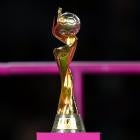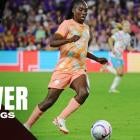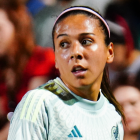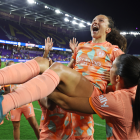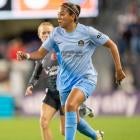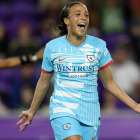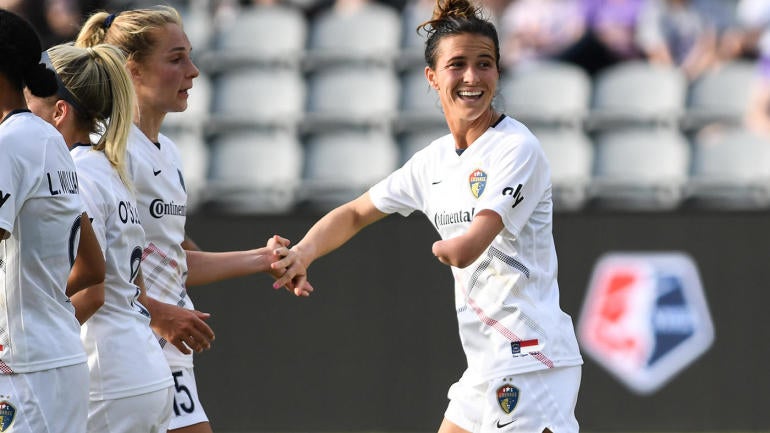
After a 1-2-1 start to the season, Carson Pickett and the North Carolina Courage are looking to get back to winning ways on Saturday as the NWSL returns from international break with a matchup against OL Reign. You can catch the match from Sahlen's Stadium at WakeMed Soccer Park in Cary, North Carolina, at 4 p.m. ET on CBS.
Pickett, who was acquired via trade with the Orlando Pride during the offseason after North Carolina faced a massive player exodus, has started all five games ay left back this season for the Courage. The 27-year-old full back has slotted into the Courage's system with relative ease.
Pickett, who was born without a left forearm and is an advocate for limb difference awareness, sat down for a chat with CBS Sports ahead of the match to discuss a variety of topics, among them her first season with her new club and getting acclimated to competitive environments in Courage Country. This interview has been lightly edited for clarity and length.
You've certainly made a statement in your return to the league, getting consecutive starts with the club. How has it been getting acclimated to the Courage and their training environment specifically? We hear so often about how it's one of the most competitive environments in the league.
Pickett: I think it's so awesome to be able to have the people you're training with on your team, [have] any of them [be] able to start, and I think that that says a lot about a club. I feel like a lot of different clubs I've been at, whether it's here or overseas, you only have the 11 starters and then it drops off majorly. I feel like at any moment, anyone on this team can be a starter. I think that just says a lot about this club, they're bringing in top quality to be able to train, non-starters and starters.
I heard a lot of conversation about the "suicide mile" before I came. And luckily, we haven't done that yet. I'm praying that we don't have to. But I heard that their training environment is really hard and they do focus on a lot of fitness, and luckily for me, I feel like I've always been able to be fine in fitness. I don't mind running, especially as an outside back, I feel like there's a lot of running anyways, so sort of just feels like a normal game for me.
But this team is so fit, and I think the coolest part is that they run before practice, like before the training starts, the first thing they do is run. So then your quality has to be better, has to be like at its best for the next 60 minutes of practice. I've only ever been on teams that have run after [practice], and at that point you know you don't have to bring quality. The training environment, if there's a game on Friday, Saturday, Sunday, no matter what, you're training just as hard nearly every day. So, it is challenging, but I do feel like, especially in games, it's the most fit I've been. I'm able to be able to continue to go up and down the line and attack for the full 90 minutes where I might not have been able to do that as much before.
Suicide mile! I might have to follow up with you about that. But it has been it has been an impressive start for you so far. You were named to the team of the month in May, and at CBS sports you made our star player index. Considering everything we've gone through collectively, it feels like we're just coming back. With COVID having such an impact, would you say that maybe there is still a lag or transitional period for players getting back to a comfortable competitive standard?
Pickett: Yeah, I mean COVID was tough for everyone. I feel like even off the field, obviously, it was just as tough as it is on the field and, you know, training by yourself just isn't the same as training with the team. So, although that was the only option. I feel like when we did get back with a team, and start training -- you could have done as much fitness as you possibly could -- and still not have been game ready. So, I think that is probably the biggest thing that COVID did, was just not allow us to train together. Individual training is definitely tough, and there's just no way you can get to game fitness, in my opinion.
Doing drills by yourself just isn't the same as doing it in a team environment with a standard [that's] super, super high. I think just not being able to play a full year together no matter what team you're on, definitely takes a toll. Some people didn't play with the people that they're playing with now for like months and months, and you're used to playing for nearly a year with them. So I think fitness-wise, obviously, it was really tough. But that team environment I feel like was hard because there's just people all over the world trying to get games and you just got not getting that team environment that you that you need for the next year.
Looking at the present, you and the Courage faced a bit of a challenge in a recent narrow loss against Chicago, and postgame, Paul Riley mentioned that it was back to the drawing board, which isn't the first time he's said that after matches against Chicago. So what does it mean for the team to go back to the drawing board?
Pickett: Yeah, I mean, we've had some dominant performances this year. And I think that [loss] was really tough for our team. I think Chicago, for some reason, no matter what team I've been on, has always been a really hard place to go and take points from. I have no idea why, but they're a good team. I just think it's getting back to like the fundamentals, it's not like as dramatic as everyone thinks it is. But I do think that it's just gone back to what we're good at, focusing on us and focusing on our team and getting better each day as individuals to help the team move forward. You know, I think that it's not worrying about you what did and didn't happen in the game, it's about moving forward and how it can be better to the next game.
Ahead of that match there was a really significant moment of solidarity during the anthem, and Chicago players have gone on-record saying that moving forward, they're not trying to be exploited in showing support to Casey Krueger, and starters who do want to participate in the anthem to exercise their right to protest will still be doing so. But during the kickoff, all the Courage players ran over to Chicago's side in what was a supportive moment of protest, was there discussion ahead of the match about potentially doing that? Or was that something more reactive?
Pickett: Yeah, there was discussion for sure. I think that we look towards Lynn Williams, Jess [McDonald], Taylor [Smith], and we just want to support anyone and everyone no matter if you're on our team or not. I feel like [teams in] the league in times like this, the girls come together no matter if your opponents or teammates. Lynn Williams said that she thinks it would be really awesome for us to go over there and support them. I think that that's what's really cool about our team is that whenever someone speaks up, we always back them. So whatever they decided to do, and whatever our team decided to do, it was 100%, and we were going to do it and support them no matter what.
No matter if you're an opponent, everyone seems like family in this league. Whether you know people or not. I feel like the teams are all super close, and we're all moving forward, as best we can to support each other. Personally, that's what I want to do. I just want to support anyone and everyone in this league, no matter what it's for. So, Lynn did speak up and say "I think it'd be really cool to go do that and kneel by them" and so that's what we did and I think it was a really, really touching moment.
Just to follow up: Andy Sullivan recently gave a really good response to a postgame questions about kneeling during the anthem and support as a white teammate, and the importance of sort of pushing oneself to be uncomfortable. Why do you personally think it's important to participate and continue showing support and protest during the anthem?
Pickett: My answer is probably not as in-depth because I need a lot more time to really get enough words on it, but for me I just think that I want to support my friends who feel like family. Whatever they want to do and whatever they feel is necessary, whatever it makes them feel comfortable. I want them to be able to feel comfortable telling us as teammates and us as friends. I want to learn more, and I do want to ask hard questions, and I want to have the hard conversations because I haven't had to deal with [racism]. So any way that I can, I would just love to support all of our teammates, all the girls in this league, because I do feel like we're one big family no matter what happens. This is so much bigger than soccer, and however I can make someone feel comfortable, or help support people who feel like family, that's what I want to do.
I appreciate you taking the time to answer, thank you. Looking ahead to OL Reign, what's the preparation like during the international window ahead of this next match?
Pickett: So we have had a hard week of training, and we [did] have a couple days off, which is nice. I think it gives us time to just recover and get our bodies right. Training here is, is just it's hard no matter what week it is, but I will say this week has been very difficult in the best way possible. I feel like also after a loss, everyone just wants you to know how to get better and try harder. Because it's not fun to lose points on the road. So, I think just coming back into training everyone was hungry just to get better for themselves and for the team. But moving forward, we're not [just] looking towards the Reign necessarily, we're just worrying about how we can become better as a team, each and every day."













